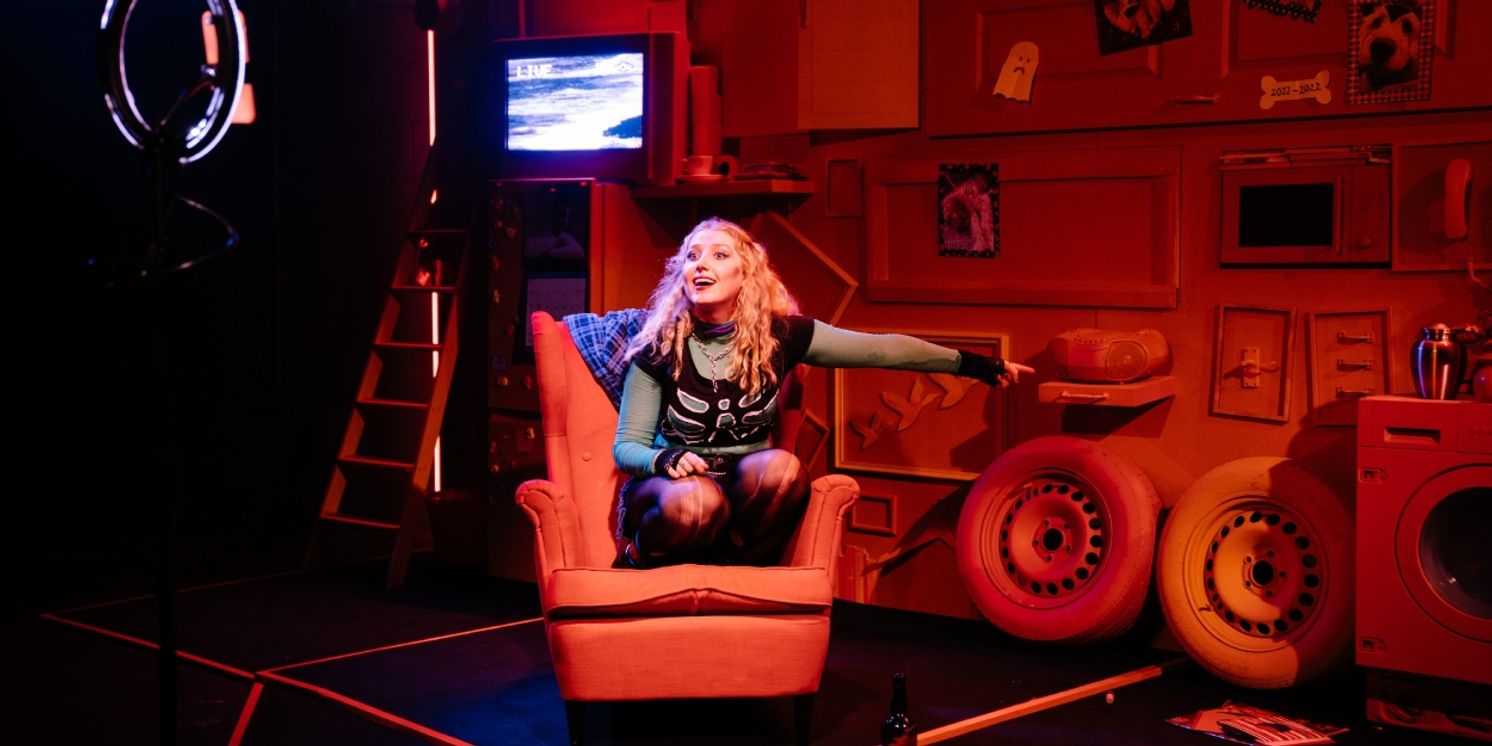Review: DADDY ISSUES, Seven Dials Playhouse
Lewis Cornay's new play offers a forensic dissection of the ramifications of mourning and suicide through the eyes of a young person.

![]()
Warning: This review contains references to suicide.
It's the first anniversary of the death of Imi's father and she's having a lonely wake for Roger, her 8-month-old therapy dog whom she's convinced absorbed all her feelings and kicked the bucket for it. "We're the live, get on with it, cry on your own silently kind of family", she says. As she starts streaming her grief online from her "chintzy granny annexe", writer Lewis Cornay offers a forensic dissection of the ramifications of mourning and suicide through the eyes of a young person.
Drunk on pain and port, the character analyses her trauma reactions and self-imposed isolation while making a joke of everything they tell us not to joke about. Directed by Jane Moriarty, it's a fresh and empathetic script geared towards a younger crowd that's as irreverent as it is profound. Imi has made an aesthetic out of not doing well and turned against her mum when her dad drowned himself.
He comes through as an intrusive thought, progressively more verbally abusive and antagonistic as her resentment takes the shape of cynicism and self-destruction. Underneath the bitter shell lies a hurt woman who's been left to her own devices to make sense of the tragedy. She describes how in the aftermath of his death she went from utter celibacy in to a sexual interest in older men, her amusement with being mistaken for their daughter only adding to her grim outlook.
She shares their muddled memories, how his passions, interests, and quirkiness were the same as hers - or were they? The eventual mischaracterisation during and after his funeral kickstarts a reflection on intergenerational suffering and coping mechanisms. Her grandfather's voice interjects too, not-that-lovingly berating her sensitivity and commenting on the disintegration of her emotions.
Bebe Cave bitterly rationalises everything as Imi, channelling it into perceptive connections to explain her trajectory. Her grandfather murdered his emotions and emotions murdered her father, she muses as she chugs wine, delves into her triggers, and slices the matter open to reveal the guts of it. "I've inherited his madness" she declares at the apex of her psychosis.
All the while, people are tuning in to see her breakdown. While Cornay doesn't expand on the voyeuristic nature of her emotional explosion, there's something to be said about the morbid tendencies of an audience (both Imi's fictional one and us sitting in the room) to sit and watch somebody's unravelling.
The text isn't revolutionary in structure or concept, but its emotional intelligence makes a difference. Cornay's isn't an attempt at providing a way out for youths in danger or anything of the like. It's a cross-age opportunity to explore the effect of grief in the most mundane of things. Imi doesn't remember her dad's voice anymore, even though it's what thunders in her bones on the daily as rancour overtakes every aspect of her life.
Moriarty has Imi caged in a triangular stage against a monochromatic painted-over peach-coloured set designed by Andrew Exeter (who also curates the lights). Cave looks like she's out of Andrew Lloyd Webber's Cinderella (excuse us - it's Bad Cinderella now), all goth chains and ripped tights by Sophia Pardon. Her pain makes her sadly cool. The actor gives an honest, genuine performance that's steeped in realism even when her philosophising takes her into an darker dimension.
Daddy Issues is a play for those who are dealing with the heartache of losing someone, those who can't overcome it, and those who are there to support them. As Imi lines up her grandad's Xanax and we see the extent of her hurt, she edges back and forth. Her mum, a presence in her phone and complaints, is one to ignore. Her friends didn't come to the funeral and make unaware jokes about killing themselves all the time. What's left to do, after all?
Cornay leaves the piece rather open-ended but implicitly on the up, withdrawing his solutions and leaving Imi to an undetermined destiny. There's a multitude of scenarios that can happen after the end, and this reviewer has at one point personally explored all of them. You don't recover from something like this, you just get better at living with it. Reach out.
Daddy Issues runs at the Seven Dials Playhouse until 19 November.
Photo credit: Helen Murray
If you or anyone you know are experiencing issues similar to Imi or her dad's, you can find help below.
Samaritans: call 116 123 or email jo@samaritans.org
Papyrus (for people under 35): call 0800 068 41 41 or text 07786 209697
Campaign Against Living Miserably: call 0800 58 58 58 and webchat
Reader Reviews
Videos

